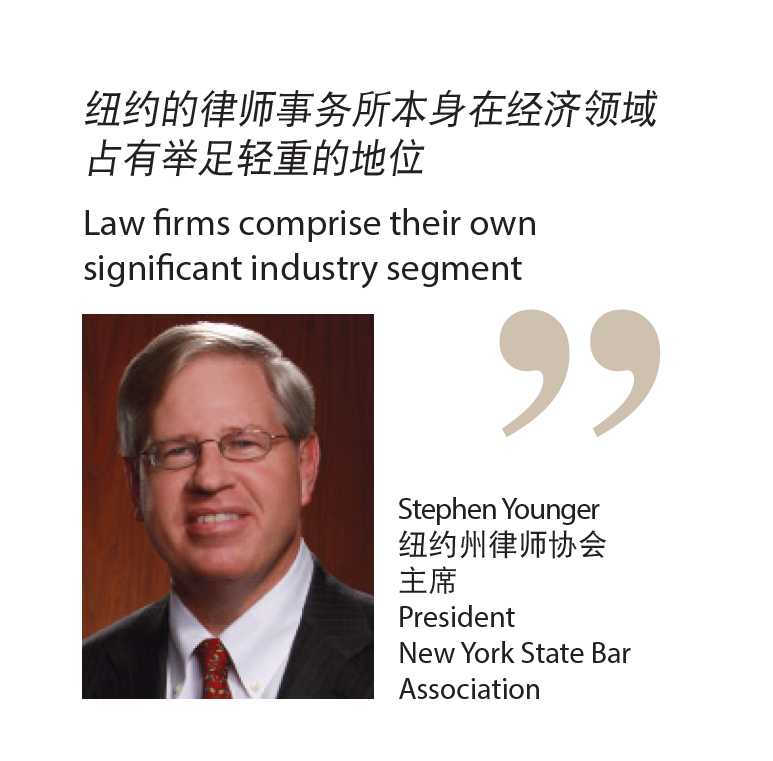Though hamstrung by high costs and security worries, New York retains an aura that draws Chinese companies seeking a foothold in the US market and Chinese lawyers seeking to further their careers.
George W Russell reports on the undiminished allure of America’s capital of law
By George W Russell
Beijing Vantone Real Estate, a large and well-connected property development group, couldn’t have chosen a more symbolic location for its flagship project in the United States. Vantone will occupy about 17,650 square metres (190,000 square feet) on five floors of 1 World Trade Center, the building that will replace the twin towers destroyed by terrorists in 2001.
The project, called China Center New York, is intended to be a bridge to the city for Chinese businesses as well as to help US companies engage with China. The location, to which the centre will move in 2014, is a strong signal that despite a prolonged economic downturn, high costs and a lockdown security mentality since 2001, the city of New York maintains its place as a major destination for Chinese investment.
Vantone’s decision – it signed a 23-year lease at US$80 per square foot – reflects deepening ties between corporate China and New York, a partnership that has flourished since Ah Ken, an immigrant merchant from Canton (Guangzhou), opened the city’s first discount cigar store on Park Row in the 1850s. “The relationship between New York and China is both strong and reciprocal,” says Kathryn Wylde, president and chief executive officer of the Partnership for New York City, a business lobby group.
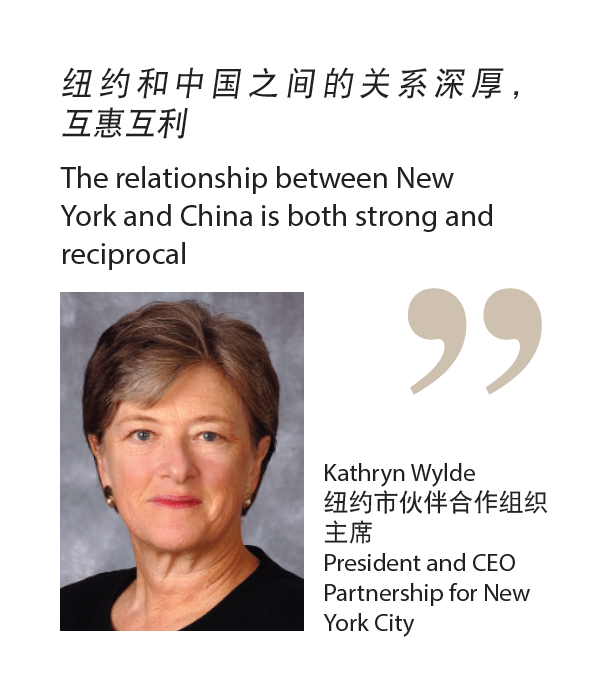
The city’s still-massive financial infrastructure is a huge draw. More than 40 Chinese companies are listed on the New York Stock Exchange (NYSE) and an additional 100 are listed on Nasdaq, including Baidu, which is part of the Nasdaq 100 index. “Nasdaq is the exchange of choice for innovative, growth-oriented companies across all key sectors of China’s economy,” says Eric Landheer, head of Asia-Pacific at Nasdaq OMX.
China is also building up its financial infrastructure in New York. China Construction Bank opened its first US branch on Sixth Avenue last year. A few months earlier, in October 2008, China Merchants Bank became the first major Chinese bank with a New York presence when it began trading from a Madison Avenue office. Industrial and Commercial Bank of China set up its US headquarters on Park Avenue weeks later.
Legal services, at a price
For law firms, China’s engagement with New York could prove particularly lucrative. Ya says one of China Center’s first major decisions was to engage legal counsel to advise it on real estate services, and operational and management issues. This was not a decision taken lightly. “It is no secret that New York law firms are expensive,” she says. “It is often a tough choice for Chinese companies to juggle between selecting a top-service law firm and paying their fees.” Nevertheless, China Center settled on New York-based Milbank Tweed Hadley & McCloy as its lead counsel.
Despite their high cost, New York law firms have always been at the forefront of the US’s business with China. The ties that many law firms have with China date back to the 1970s – soon after president Richard Nixon’s administration recognized the People’s Republic. Many lawyers working on pioneer China deals in that period continue to work in New York. “I was one of the first lawyers to do a deal in China in 1979,” recalls Alice Young, chair of the Asia practice at Kaye Scholer in New York.
To be sure, some law firms insist that today’s clients require a global presence and no one location can provide all the necessary services. “Clients now require a diverse array of sophisticated legal services to help them meet the challenges of succeeding in the post-downturn global economy,” says Jeffrey Kohn, managing partner of O’Melveny & Myers’s New York office.
New York continues to be a global legal hub. “Law firms comprise their own significant industry segment, creating thousands of jobs, occupying high-end real estate and conducting business with the thousands of other business in New York active in keeping the business of law firms running, from technology companies to providers of offices supplies,” says Stephen Younger, president of the New York State Bar Association and a partner with the New York firm Patterson Belknap Webb & Tyler.
According to the association, more than 250,000 attorneys are licensed in New York, with more than 150,000 of them working or residing within New York. In 2007, the last year for which figures are available, lawyers and legal services in the city generated nearly US$38 billion in revenue, with a payroll of more than US$12 billion.
In addition, the legal market drives related industries such as legal education, corporate printing and document management, court and translation services, recruiting and other business and professional services. “The provision of legal services is a critical sector of New York’s economy on several levels,” Younger adds.
The positioning of New York as an attractive destination for multinational corporations and financial institutions has been a cornerstone of the administration of Mayor Michael Bloomberg, in office since 2002. “Attracting international financial services institutions is central to the Bloomberg administration’s financial services initiatives,” says Robert Lieber, the city’s deputy mayor for economic development.
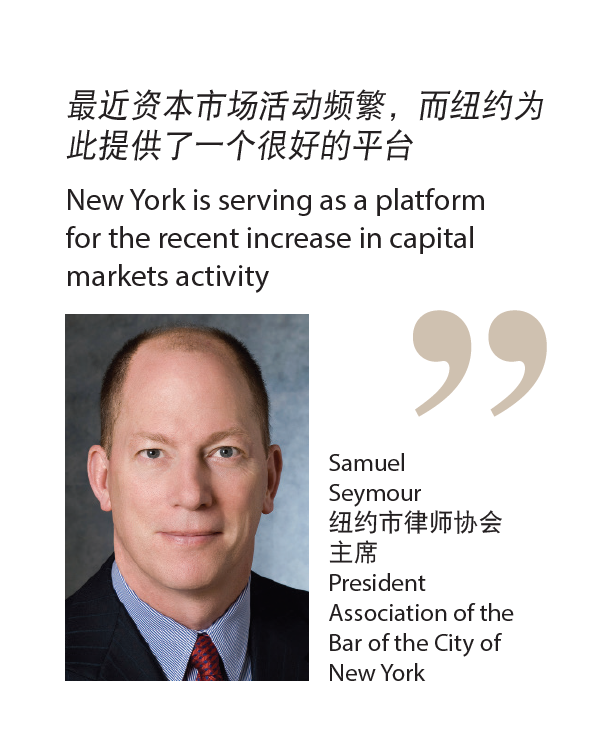
Stopping the rot
Officially, the city of New York comprises the five boroughs – Manhattan, Bronx, Brooklyn, Queens and Staten Island – clustered around the mouth of the Hudson River. For practical purposes, however, the metropolitan area encompasses the suburban counties of Nassau, Suffolk (on Long Island), Westchester, Fairfield in Connecticut, and the bustling New Jersey counties of Bergen, Essex, Hudson, Passaic and Union. More than 18 million people live in the wider region.
After emerging from World War II as the richest city in the world – the United Nations moved there in 1951 – industrial decline, migration to suburbia and gathering racial tensions picked holes in the city’s social fabric and economic underpinnings.
New York has long struggled to balance its books. The consolidation in 1898 of several local authorities into the city of New York was prompted partially by a desire to rationalize spending. In 1975, the city came close to defaulting on its debts, inducing then-mayor Abraham Beame to go to Washington and beg for a bailout. President Gerald Ford turned him down, prompting the Daily News front-page headline: “Ford to City: Drop Dead”.
By 1977, the city was at its nadir as crime soared and the infrastructure fell apart: a lightning-induced electrical blackout resulted in an orgy of violence and looting, and the “Son of Sam” serial killer roamed at will. While the Wall Street boom of the 1980s restored the economy, lawlessness and unemployment continued unabated until the 1990s, when the city began a period of prosperity that lasted until the current downturn. New policing methods sharply reduced the crime rate, although the rich-poor divide has grown.
Julie Wood, vice-president of public affairs at the New York City Economic Development Corporation, says the city can still build upon its financial reputation. “New York City has improved its status as the world’s premier business centre in the past decade,” she says, citing a recent Bloomberg News global poll of investors, traders and analysts that showed 29% favouring New York as the best place for financial services for the next several years (compared with 17% for Singapore and 16% for London).
Lawyers say New York remains very important. “New York is among the most important states for corporate law, second only to Delaware,” says James Yong Wang, a partner in Greenberg Traurig’s New York and Shanghai offices. “And unlike Delaware, the leading state of incorporation for major corporations, New York is where major transactions actually occur and business is done.”
City boosters say New York can see off competition from rival regions, despite the implosion of the “Silicon Alley” technology entrepreneurs centred on Manhattan’s Flatiron and SoHo districts during the 1999-2000 dotcom bust. “New York has an incredibly robust venture capital technology sector,” says Kathryn Wylde, president and chief executive officer of the Partnership for New York City, a business lobby group. “I think Boston is out of the running.”
Wylde says the next challenge to address is competing with Silicon Valley, a sector in which Mayor Michael Bloomberg has shown particular interest. “Over the past eight years of his administration, he has worked very hard to encourage high-tech entrepreneurial activity,” says Wylde, a close ally of the mayor. “And now we have seen it blossom in New York.”
In August, the city saw the opening of the first major facility at the East River Science Park, the city’s purpose-built biotechnology cluster designed to lure investment away from Silicon Valley and the Boston-Cambridge corridor.
China: New York’s future
City officials say China has been New York industry’s largest export market since 2000. “China is the largest market for the future growth of many of New York’s international businesses,” says Wylde. “The trade and investment relationships between China and New York are critical to New York City’s status as a leading world city and financial capital.”
Similarly, China-related business is a critical practice area for many New York law firms: while Hong Kong was the gateway to China for decades, more than 50 Big Apple firms have now opened offices in Beijing and Shanghai. In return, several Chinese firms have recently opened New York offices, while a cottage industry has emerged to guide Chinese lawyers through the popular New York state bar examination.
Lawyers doubt that the rise of regional economic hubs can diminish New York’s influence. “The rise of numerous international financial hubs and the substantial interdependence among them give rise to opportunity for economic and business development and the growth of professional service firms,” says Rocky Lee, a partner and head of the Asia-Pacific practice at Cadwalader Wickersham & Taft in Beijing. Their rise “neither diminishes the relevance of the New York financial markets nor suggests the eclipse of New York firms”.
In addition, many international contracts, including those involving Chinese entities, are written under New York state law, creating a commercial interdependence that few cities can rival. “New York is essential to any law firm pursuing a global strategy,” says Ward Bower, a principal at Altman Weil, a strategic adviser to law firms based in Newtown Square, Pennsylvania. Only London comes close, say lawyers, as English law plays a similar global role, and the UK’s system of regulation of the capital markets is favoured by many companies over New York’s.
Capital markets, M&A
Despite growing competition, the raising of money on capital markets is still a key New York industry. The last quarter of 2009 saw the beginning of a revival after the most recent economic downturn. “The clear competitive strength of New York firms is in financial services,” says Bower. “Nowhere else in the US comes close to the concentrated strength of New York firms in this area of expertise.”
More than 30 of the 100-plus Chinese companies on Nasdaq listed only last year, including videogame developer Shanda Games, which raised US$1 billion in its September 2009 initial public offering. “New York is serving as a platform for the recent increase in capital markets activity,” says Samuel Seymour, president of the Association of the Bar of the City of New York and a partner with Sullivan & Cromwell. “IPOs have returned to levels not seen since the start of the global financial crisis, and a number of Chinese companies have joined the ranks.”
New York has also benefited from the sharp growth in alternative public offerings (APOs). An APO is often a combination of a reverse merger with a simultaneous private investment in public equity. “APOs have grown significantly in the past five or six years, largely driven by the demand from emerging Chinese companies that were not able to meet the more stringent listing requirements of China’s stock exchanges or NYSE and Nasdaq,” says James Yong Wang, a partner with Greenberg Traurig’s Shanghai and New York offices who specializes in cross-border corporate and private equity matters.
Chinese companies also have a significant need for sophisticated legal representation in connection with mergers and acquisitions and banking activity in the US that, lawyers say, is best suited to New York-based firms. “Only a few high-end, New York-based international firms have the sophisticated practice, range of offices around the world, and resources to address the complex needs of Chinese companies,” says Seymour.
Other lawyers point out that the US is far from the easiest jurisdiction in which Chinese companies can operate. “The US is still perceived to be a more difficult market to do acquisitions,” says Wang. “While the volume of overseas acquisitions by Chinese companies has risen significantly in the past few years, those were still dominated by large state-owned enterprises and resource players, and many of them occurred outside of the US, in places such as South America or Africa.”
However, Wang does see a trend towards M&A activity in specific sectors. “I’m working with major private Chinese conglomerates on overseas acquisitions,” he says. “One type of such companies are export-oriented Chinese manufacturers, who are most interested in acquiring US brands and distribution channels for their products.” Also, Chinese manufacturers are increasingly exploring setting up manufacturing operations in the US in order to remove the “Made in China” tag.
“Another type of such companies are domestic-market-oriented companies that are interested in opportunities in new, growing areas in China such as hospitality, high-end hospital management, healthcare insurance, nursing home management or asset management, and such experience and skills can only be gained through acquisitions or investments in, or other types of collaboration with, successful foreign companies in such areas,” Wang adds.
Chinese firms move in
While New York law firms have been setting up in China for many years, more recently the trend has been in the other direction. Dacheng Law Offices is the latest Chinese law firm to open in New York. “It is vital for Dacheng as a global law firm to establish the firm’s legal footprint in New York, one of the most significant capital centres of the world,” says Xiao Ling, a partner and managing attorney of Dacheng’s Los Angeles office, which was its first international outpost.
Xiao says the New York office will initially be staffed mainly by non-Chinese lawyers, a departure from the tactics of most Chinese firms in the US. “Its attorneys and staff are diverse in background, experience and culture,” she adds. “In operating within the strictures of US law, the emphasis will be on maintaining a balance of culturally diverse lawyers able to provide the high level of service and skill demanded by its clientele.”
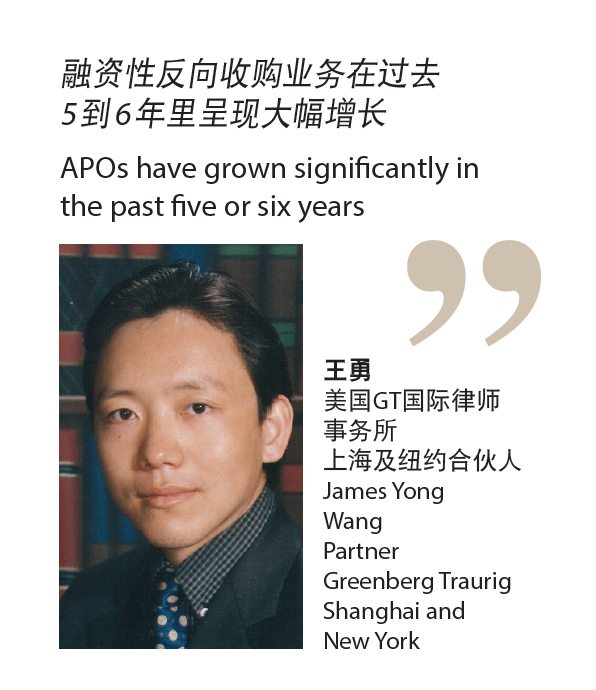
As Dacheng shows, not all Chinese firms see New York as a first stopping point. Deheng Law Firm’s US headquarters is in Chicago, while King & Wood opened first in San Francisco. Xiao says the decision to open in California first was client-driven. “Los Angeles is a prime location for access to its media and entertainment industry. Both are areas of big interest to Chinese companies.” The office was also strategically located for clients interested in energy resources, solar energy and oil and gas companies, she adds.
A magnet for lawyers
Many Chinese lawyers acknowledge that New York has a special significance to them. A scan of any China legal directory will show dozens of lawyers with New York bar admissions, such as Liu Cheng, a former DLA Piper antitrust lawyer who joined King & Wood in Beijing as counsel for its international trade group in 2010, Michael Qi, a partner with Fangda Partners in Shanghai, and Donna Li, a senior partner with Allbright Law Offices who was once a member of the Asian Affairs Committee of the Association of the Bar of the City of New York.
It’s not just appearances: there are practical reasons to be admitted to the New York state bar. “They usually prefer to get licensed in New York partly because of the prestige associated with being a New York attorney, and partly also because New York is one of the very few states that do not require a three-year juris doctorate degree in order to sit for its bar exam,” says Wang at Greenberg Traurig.
Law schools are trying to make it easier for foreign students. “Hofstra offers a masters of law in American legal studies for non-residents with subject specializations in 14 areas such as commercial law, corporate and securities law, and intellectual property law,” says Nora Demleitner, dean and professor of law at Hofstra University School of Law in Hempstead, Long Island. “Upon completion of this degree, foreign students can sit for the New York state bar exam and practice law in the United States.”
Wang at Greenberg Traurig, who trained at both Peking University Law School in Beijing and Columbia University in New York, is among only a few Chinese who have made partner in the New York office of an international law firm. “Chinese lawyers also prefer to get a few years of work experience in New York before going back to China,” he adds, “and corporate training at New York law firms is generally perceived to be the most sophisticated.”
Continuing appeal
New York is unlikely to lose its magnetism to the next generation of lawyers, either. “The prospect of attending school in New York is a big draw for aspiring lawyers,” says Demleitner. Nick Rees, the New York-based co-managing partner of US offices for Linklaters, points out that many young attorneys choose to start their careers in New York specifically because they want to work on sophisticated and high-profile matters. “There is definitely a perception among many lawyers that receiving their early training at a firm in New York will put them in good stead for a move elsewhere later on in their careers,” says Rees.
More Chinese lawyers are pursuing New York state bar certification and, as a result, one emerging industry is bar certification preparation. “So many Chinese lawyers come to the US, receive their LLM and then rely on us to prepare them for the New York state bar examination, “ says Lori Sandstedt, a coordinator with Pieper Bar Review, an educational preparation company in Mineola, New York. “Holding a licence to practice here is a valuable addition to any lawyer’s credentials,” she adds.
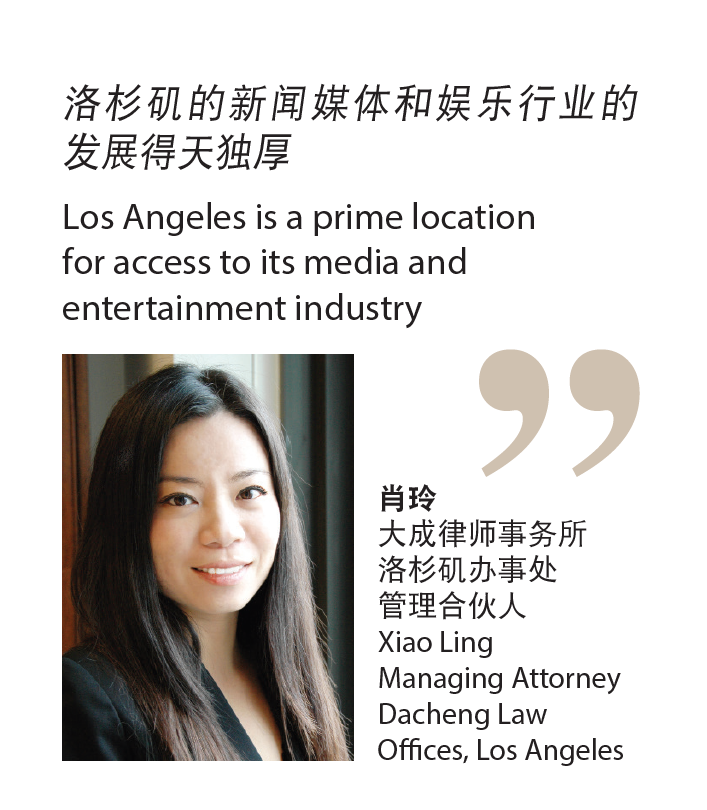
The New York difference
New York lawyers are unfazed by the growth – and burnished credentials – of indigenous Chinese law firms. “The growth of these law firms is a positive sign,” says Young at Kaye Scholer, “but New York law firms still have an edge in that they have the international long-term experience in dealing with transactions in various jurisdictions.”
Lawyers point to the technical aspects of US law that require hands-on experience. Young points to the Sarbanes-Oxley Act of 2002, the Foreign Corrupt Practices Act of 1977 and Federal Communications Commission and antitrust regulations as examples. “In China, antitrust laws have only recently been enacted and have not been fully developed as yet,” she says.
The complexity is unlikely to disappear. Wylde points to the Dodd-Frank Wall Street Reform and Consumer Protection Act of 2010 as a more recent example. “As financial regulatory reform takes hold, there will be a huge amount of interest and activity,” she says. “The New York legal community will be more than busy.”
Analysts don’t expect large emerging markets such as China to loosen New York’s hold on the legal world. “New York, in particular – even as China and India ultimately eclipse the size of the US economy – will long be a stronghold as the world’s preeminent and most attractive legal market,” says Peter Zeughauser, a strategic adviser to law firms based in Newport Beach, California. “The concentration of talent and historic relationships with money sources that fuel globalization are deeply entrenched and more plentiful in New York than anyplace else.”






